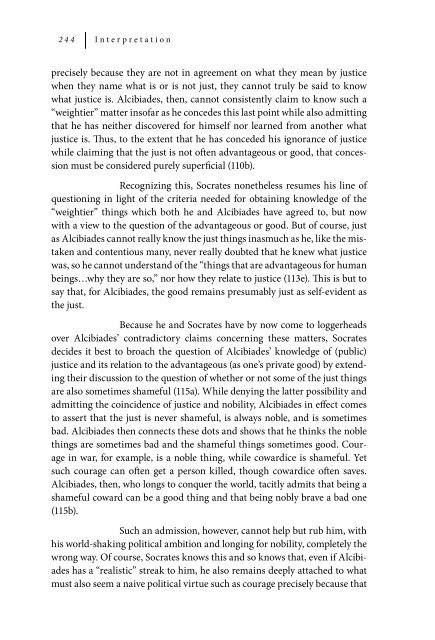Spring 2010 - Interpretation
Spring 2010 - Interpretation
Spring 2010 - Interpretation
Create successful ePaper yourself
Turn your PDF publications into a flip-book with our unique Google optimized e-Paper software.
2 4 4<br />
I n t e r p r e t a t i o n<br />
precisely because they are not in agreement on what they mean by justice<br />
when they name what is or is not just, they cannot truly be said to know<br />
what justice is. Alcibiades, then, cannot consistently claim to know such a<br />
“weightier” matter insofar as he concedes this last point while also admitting<br />
that he has neither discovered for himself nor learned from another what<br />
justice is. Thus, to the extent that he has conceded his ignorance of justice<br />
while claiming that the just is not often advantageous or good, that concession<br />
must be considered purely superficial (110b).<br />
Recognizing this, Socrates nonetheless resumes his line of<br />
questioning in light of the criteria needed for obtaining knowledge of the<br />
“weightier” things which both he and Alcibiades have agreed to, but now<br />
with a view to the question of the advantageous or good. But of course, just<br />
as Alcibiades cannot really know the just things inasmuch as he, like the mistaken<br />
and contentious many, never really doubted that he knew what justice<br />
was, so he cannot understand of the “things that are advantageous for human<br />
beings…why they are so,” nor how they relate to justice (113e). This is but to<br />
say that, for Alcibiades, the good remains presumably just as self-evident as<br />
the just.<br />
Because he and Socrates have by now come to loggerheads<br />
over Alcibiades’ contradictory claims concerning these matters, Socrates<br />
decides it best to broach the question of Alcibiades’ knowledge of (public)<br />
justice and its relation to the advantageous (as one’s private good) by extending<br />
their discussion to the question of whether or not some of the just things<br />
are also sometimes shameful (115a). While denying the latter possibility and<br />
admitting the coincidence of justice and nobility, Alcibiades in effect comes<br />
to assert that the just is never shameful, is always noble, and is sometimes<br />
bad. Alcibiades then connects these dots and shows that he thinks the noble<br />
things are sometimes bad and the shameful things sometimes good. Courage<br />
in war, for example, is a noble thing, while cowardice is shameful. Yet<br />
such courage can often get a person killed, though cowardice often saves.<br />
Alcibiades, then, who longs to conquer the world, tacitly admits that being a<br />
shameful coward can be a good thing and that being nobly brave a bad one<br />
(115b).<br />
Such an admission, however, cannot help but rub him, with<br />
his world-shaking political ambition and longing for nobility, completely the<br />
wrong way. Of course, Socrates knows this and so knows that, even if Alcibiades<br />
has a “realistic” streak to him, he also remains deeply attached to what<br />
must also seem a naive political virtue such as courage precisely because that
















